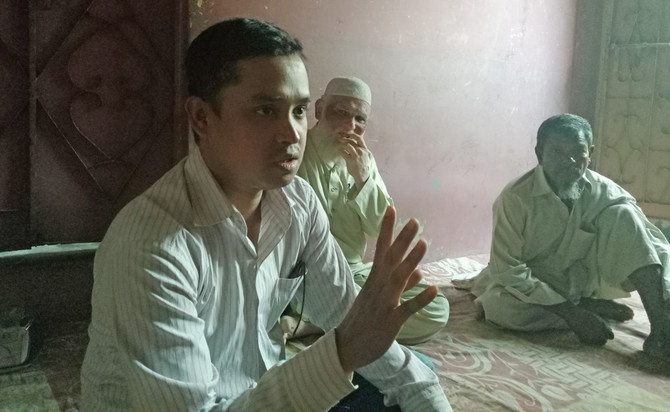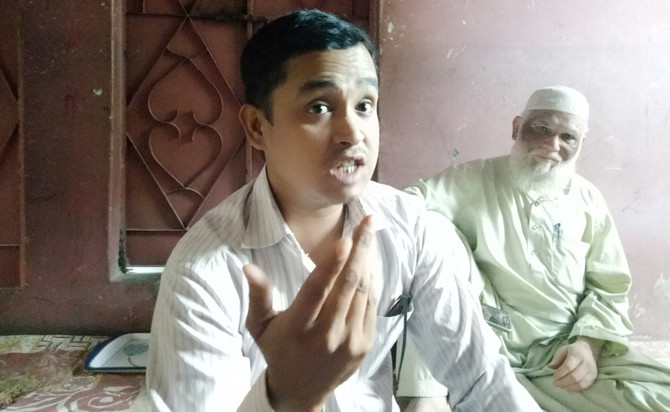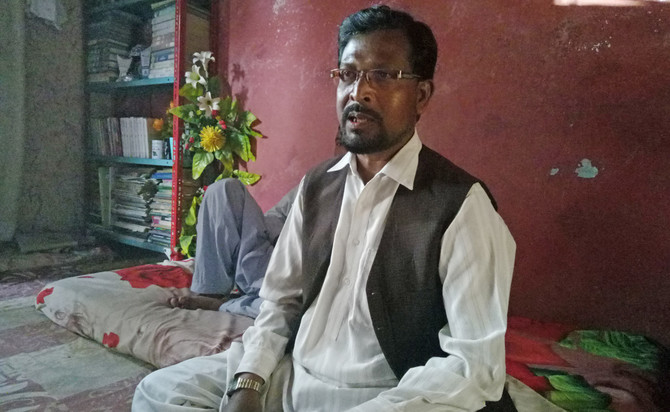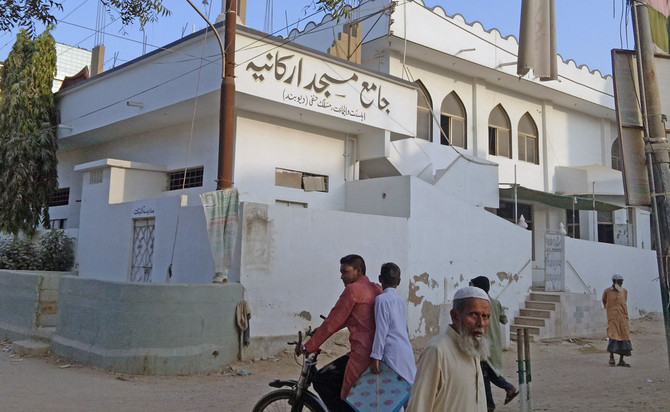KARACHI: Life for 42-year-old Noor Alam, a Rohingya Muslim living in Baldia Town, was never smooth.
Alam, a father of four, caught polio which made him partially disabled.
His problems increased as his children grew up, Syed Muhammad Yousuf, Alam’s friend and a Rohingya activist, told Arab News.
Alam, who drives an autorickshaw to earn for his family, was born in 1965 in Karachi where his parents came from, in what was then East Pakistan – it’s now Bangladesh.
In 2014, two of his four children – a daughter and a son – were promoted to Grade Nine, for which they required a computerized B-Form.
B-Form, a certificate mandatory for enrolling in secondary education, had not been needed before.
“When he applied for a B-Form for his two children, the local officials of NADRA (National Data Base Registration Authority) sent his case for verification,” Yousuf explained, but three years later verification has not been completed.
His elder son and daughter have not been able to acquire secondary education and Alam is also worried about his two other children.
The identity cards of his entire family are now blocked.
It is not only Alam’s story, Yousuf said. “This is the story almost every second of over 800,000 Rohingya families living in the commercial capital of Pakistan.”
All those able to get higher education did so before 2014 when the B-form wasn’t declared mandatory for enrolment.
The Rohingya community in Pakistan is living in a state of uncertainty and “the issue of education of their children tops its list of problems,” said Shaheedullah, a Rohingya youth.
Zabihullah Arakani, President of the Pak Rohingya Welfare Organization, told Arab News that the Rohingya community lived in more than 60 slums in Karachi.
The last influx of Rohingya came to Pakistan in the early 1990s, said 64-year-old Muhammad Saleem, who still remembers his horrifying journey from Myanmar to East Pakistan in 1969.
His family came to Karachi after spending a few years in East Pakistan. He complained that despite having lived in the country for decades, the Rohingyas are denied a Pakistani identity.
Back in Myanmar, he said, oppression of Rohingyas started in 1942, even before Burma’s independence.
“We came here in 1969, after which life in Burma became difficult for the Rohingyas,” Saleem added.
Here in Pakistan, community members say they want nothing but an identity and education for their kids.
Reports suggest that the Rohingya exodus to Pakistan began soon after Pakistani President Ayub Khan – who had served in Burma from 1942 to 1945 – offered during his visit to the country in 1965 to settle them on Pakistani soil.
Those who reached Karachi praise Zulfikar Ali Bhutto, former prime minister, and General Zia-ul-Haq, a former president, who allowed them to leave their refugee camps and live in the city like Pakistani nationals; but Rohingya are not happy with Bhutto’s party.
In September a senator from Bhutto’s Pakistan People’s Party, on an adjournment motion in Pakistan’s upper house, called for giving Rohingya Pakistani nationality. But he invited the ire of men of his own party, which is dominated by Sindhi-speaking people.
In November 2017, when he was Minister of State for Interior, Talal Chaudhry presented a plan to amend the Pakistan Citizenship Act of 1951 to give Pakistani nationality to Bengalis and Burmese living in Sindh. Aijaz Dhamra, Sindh Information Secretary of the Pakistan People’s Party, said that the people and the government of Sindh would not let it happen.
This opposition to awarding nationality to Rohingya, along with the interior ministry’s recent measures for more checks, has increased the miseries of the community in Pakistan.
Without computerized national identity cards, Rohingya are struggling to find jobs.
In Arkanabad in the Korangi town of Karachi, the community is associated with the fishing industry.
“Despite sharing most of the burden, I am paid less than my Pakistani fellows just because I have no identity here,” said Abul Salam, a fisherman.
“We want an identity but if even that’s denied to us, our children have the universal right to education.”
“If a way out wasn’t suggested amid these strict rules of NADRA, the coming Rohingya generation in Pakistan would be completely illiterate,” said Yousuf.
Rohingya in Karachi are ‘denied a Pakistani identity’
Rohingya in Karachi are ‘denied a Pakistani identity’

Pakistan to launch direct flights to Azerbaijan on April 20 as bilateral ties grow

- The announcement comes after PIA reported operational and net profits for the first time in 21 years
- Pakistan and Azerbaijan have vowed to deepen strategic cooperation in trade, energy and defense
ISLAMABAD: Pakistan’s national flag carrier on Sunday announced it will begin direct flights to Baku, the capital of Azerbaijan, from April 20, as the two countries move to deepen strategic cooperation across trade, energy, defense and regional connectivity.
Pakistan and Azerbaijan have been stepping up bilateral collaboration, with Islamabad offering Baku and other Central Asian states access to its Gwadar and Karachi ports.
In return, Azerbaijan committed to a $2 billion investment in Pakistan’s mining, energy and infrastructure sectors during Prime Minister Shehbaz Sharif’s visit to Baku in February.
Pakistan International Airlines (PIA) announced the new service at a special ceremony in Karachi held in honor of travel agents and tour operators, who were briefed on the new route.
“PIA will operate two weekly flights from Lahore,” the airline said in a statement after the gathering, adding that “flights to Baku will depart on Sundays and Wednesdays.”
PIA said the direct connection to Azerbaijan would help boost two-way tourism and commercial ties, adding it was committed to ensuring the viability of the Baku route and strengthening its presence in the Central Asian market.
The Pakistani national airline, which has long struggled financially, surprised observers earlier this month by posting an operational profit of $33.48 million and a net profit of $94.32 million in the last fiscal year.
This was the first time in 21 years the airline has made these profits.
The launch of the Baku route is expected to support the carrier’s business further as the government pushes ahead with plans to privatize it under a $7 billion International Monetary Fund (IMF) program aimed at reforming state-owned enterprises and stabilizing the economy.
Pakistan’s interior minister, US congressional delegation discuss counterterror cooperation, bilateral investment

- Mohsin Naqvi says “terrorism” is a global challenge, urges international community to cooperate with Pakistan
- As Pakistan grapples with militancy, Islamabad and Washington will hold a counterterrorism dialogue in June
ISLAMABAD: Pakistan’s Interior Minister Mohsin Naqvi held talks on counterterrorism cooperation and bilateral investment with a United States (US) congressional delegation in Islamabad on Sunday, as both countries attempt to forge closer ties to battle surging regional militancy.
Military cooperation between Pakistan and the US spans over six decades, but it underwent a tactical renaissance since the militant attacks of Sept. 11, 2001.
During the US ‘War on Terror’ against the Taliban in Afghanistan, US-Pakistan relations were largely prompted by Washington’s short-term need for Islamabad’s cooperation to serve its security and strategic interests in Kabul.
A US congressional delegation in Pakistan comprising congressmen Jack Bergman, Tom Suozzi and Jonathan Jackson called on the Pakistani interior minister in Islamabad. Pakistan’s Minister of State for Interior Tallal Chaudry, Acting US Ambassador Natalie Baker and Federal Interior Secretary Khurram Agha were also present.
“Discussions on advancing cooperation in the fields of economy, trade and investment were held,” the interior ministry said. “Discussions were also held on security, counterterrorism and border security areas.”
Naqvi described Pakistan as a “wall” between “terrorism” and the world, the ministry said.
“Terrorism is a global challenge and the international community urgently needs to cooperate fully with Pakistan,” he was quoted as saying by the ministry.
The Pakistani minister stressed the importance of sharing intelligence and technology counterterrorism.
Pakistan and the US will hold a counter-terrorism dialogue in June this year. Cooperation between Islamabad and Washington in the field of counterterrorism is particularly important given the increase in militant attacks in Pakistan’s western provinces bordering Afghanistan.
Pakistan accuses Afghanistan of sheltering militants that launch attacks on its soil, allegations that have been repeatedly denied by the Taliban government in Kabul.
Pakistan’s Jamaat-e-Islami party to hold ‘Gaza Solidarity March’ in Karachi today

- JI to hold march at Karachi’s busy Shahrah-e-Faisal road at 4:00 p.m. today, says party
- At least 1,560 Palestinians have been killed since Israel resumed bombarding Gaza in March
ISLAMABAD: Thousands of supporters of prominent Pakistani religiopolitical party Jamaat-e-Islami (JI) are expected to take part in a “Gaza Solidarity March” in the southern port city of Karachi against Israel’s military offensives in the Palestinian territory.
The protest will take place days after the JI held demonstrations in Lahore and other major cities on Friday to protest Israel’s bombardment of Gaza and urge Muslim nations to stop the bloodshed.
Gaza’s Health Ministry says at least 1,560 people have been killed since the fragile truce between Hamas and Israel broke down on Mar. 18. According to Palestinian Civil Defense spokesperson Mahmoud Basal, at least 500 children are among the dead since Israel resumed the offensive last month.
“A Solidarity with Gaza March will be held on Sunday, Apr. 13 at 4:00 p.m. on Shahrah-e-Faisal in Karachi,” the JI said in a post on social media platform X on Saturday.
The JI has already announced it will lead a protest march to the US Embassy in Islamabad on Apr. 20.
Pakistan, which does not have diplomatic relations with Israel, has frequently criticized the Jewish state for its military operations in Gaza. Islamabad has also called for the resumption of humanitarian aid to the Palestinian territory and the need for a revival of negotiations leading to a two-state solution.
Islamabad consistently calls for an independent Palestinian state along the pre-1967 borders and with East Jerusalem as its capital.
Since Oct. 7, 2023, Israel’s military offensives in Gaza have killed over 50,000 people and wounded over 116,000, as per the Gaza Health Ministry.
Veteran Pakistani comedian Javed ‘Kodu’ passes away after prolonged illness

- Muhammad Javed starred in over 150 Punjabi, Urdu films and several stage productions since 1981
- Prime Minister Shehbaz Sharif says void left by late comedian’s passing is likely to never be filled
ISLAMABAD: Veteran Pakistani stage and television comedian Muhammad Javed, popularly known as “Javed Kodu,” passed away in the eastern city of Lahore on Sunday after suffering from prolonged illness, state-run media reported.
Javed, who as per media reports was 50 years old, was widely recognized for his comedic talent and distinctive short stature.
He passed away during the wee hours of Sunday after a long battle with illness. The comedian’s funeral prayers will be held at the marquee behind his residence in Lahore’s Singhpura area, state-run Associated Press of Pakistan (APP) said.
“The veteran performer, who dedicated more than four decades to the entertainment industry, leaves behind a legacy of laughter, resilience, and heartfelt performances,” APP reported.
Born with dwarfism, Javed faced numerous societal and professional challenges throughout his life, APP said.
It added that his stage name “Kodu” was affectionately given to him by legendary comedian Akhtar Hussain Albela.
Javed began acting in 1981 with the play “Sode Baaz” and went on to star in over 150 Punjabi and Urdu films, along with several stage productions.
His TV drama “Ashiyana” was a hit with fans and is arguably the most popular television project Javed was associated with.
Prime Minister Shehbaz Sharif expressed grief at Javed’s passing, praising his talent as a comedian.
“Javed Kodu, who was famous for his short stature and towering talent, leaves behind a void in the media industry that is likely never to be filled,” Sharif was quoted as saying by his office.
The late comedian is survived by his wife and two sons. One of his sons, Shera, is a popular performer on the comedy show “Mazaaq Raat.
Pakistan urges Tehran to arrest those responsible for killing its nationals in Iran

- Baloch separatists have claimed responsibility for killing eight Pakistanis in Sistan-Baluchestan
- Iranian embassy in Pakistan condemns attack, calls for joint efforts to battle “terrorism” in region
ISLAMABAD: Prime Minister Shehbaz Sharif has asked Iran to arrest the culprits responsible for killing eight Pakistani nationals this week in its Sistan-Baluchestan province, calling on regional states to adopt a coordinated strategy to defeat the menace of “terrorism.”
The news of the killings first emerged in local media on Saturday evening, though Pakistan’s foreign ministry and federal authorities did not issue immediate statements.
However, the foreign office later confirmed the development in response to media queries. It said that Islamabad was in contact with Iranian authorities and would comment once the details were confirmed.
In a separate statement, Prime Minister Shehbaz Sharif expressed grief over the killing of the eight Pakistani nationals and voiced concern over the attack on Iranian soil.
“The Iranian government must bring those responsible to justice and share the reasons behind this heinous act with the public,” Sharif said in a statement released by his office on Saturday.
The Pakistani premier expressed grief at the loss of lives in the incident.
“Terrorism is a scourge that is devastating for all countries in the region,” he added. “All regional states must implement a coordinated strategy to root out terrorism.”
The prime minister also directed Pakistan’s foreign ministry to remain in contact with the victims’ families and instructed the embassy in Tehran to ensure the safe repatriation of the bodies.
Meanwhile, Iran’s embassy in Pakistan condemned the attack as a “cowardly one,” calling for joint efforts to eradicate “terrorism.”
“Combating this ominous phenomenon requires collective and joint efforts by all countries to eradicate all forms of terrorism and extremism that have claimed the lives of thousands of innocent people in recent decades,” the embassy said.
On Saturday, Afghanistan’s Khaama Press News Agency reported the attack took place in the early hours of the day in a village in Mehrestan district, located near the Iran-Pakistan border. The outlet said the victims were auto mechanics.
However, the separatist Balochistan National Army (BNA) claimed responsibility for the attack later in the day, alleging that the slain workers were members of Pakistan’s premier spy agency.
Pakistan’s southwestern Balochistan province, which borders Iran and Afghanistan, has faced a low-level insurgency for nearly two decades. Baloch separatist groups accuse the central government of exploiting the region’s natural resources, such as gold and copper, without benefiting the local population.
Islamabad denies the allegations, saying it is committed to improving the lives of Baloch residents through various development projects.
Thousands of Pakistanis, mostly from economically disadvantaged regions, frequently cross into Iran to take up informal work in sectors such as vehicle repair, construction and agriculture.
In January last year, nine Pakistani laborers were killed and three critically injured in a similar attack in Saravan city, also located in Iran’s southeastern border region.
The victims in that case had also been working at an auto repair shop.
Last year’s killings took place at a time when Pakistan and Iran were trying to mend diplomatic ties following tit-for-tat missile and drone strikes.
















